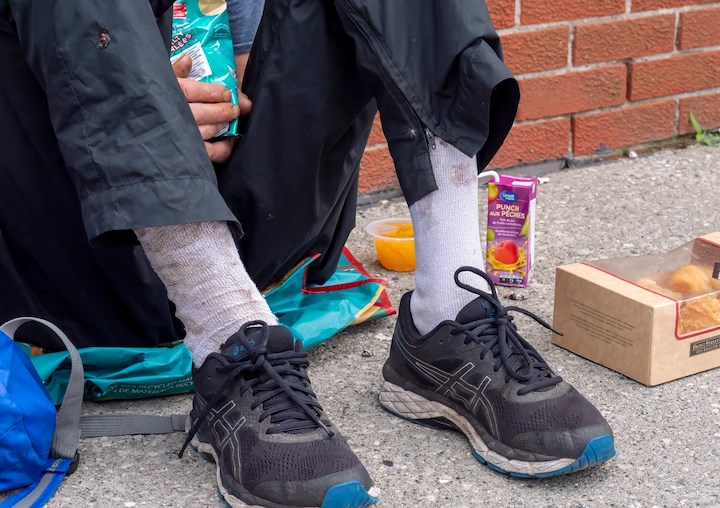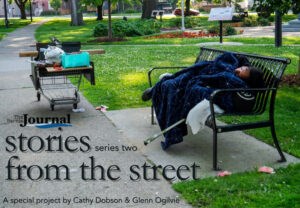Today, The Sarnia Journal kicks off Stories from the Street Series II focusing on Sarnia's homeless crisis. Stories from the Street Series I was published in March and generated a widespread response, convincing journalist Cathy Dobson and photographer Glenn Ogilvie that more stories need to be told. Please join us each day this week to read about the unique circumstances of the men and women living rough in Sarnia.
Finding a Fix for the Homeless
Cathy Dobson
Every day, Lynn Le Faive witnesses a line-up of 100 or more vulnerable folks who circle the dining hall at the Inn of the Good Shepherd while they wait for the kitchen to open.
For 14 years, she’s co-ordinated the volunteers who dish up hot meals to local residents down on their luck.
Le Faive has seen plenty of sad situations. But she’s also seen happier ones. They give her hope that people can rise above the misery of life on the street.
She tells the story of a single mom with two kids who came to the soup kitchen off and on for years.

“Her relationship had fallen apart. Drugs made her feel better. She’d lost her house, then her kids, but, you know, she managed to get off the street, get a place to live and go back to school,” said Le Faive.
“She got her Grade 12, then went to college and, surprisingly enough, she’s in social work now and she has her kids back.
“Kudos to her,” said Le Faive. “Some manage it, some don’t. Sometimes I realize I haven’t seen a person for a year and then, when I do see them, they look like a million bucks.”
It does happen. But not often enough.
Earlier this year, Lambton County councillors acknowledged that putting derailed lives back on track begins with a reliable place to call home. They voted to make shelter and affordable housing their #1 priority.
On top of that, county staff made supportive housing their top priority internally, said Melisa Johnson, manager of Lambton’s Housing Services.
There’s an important distinction between affordable and supportive housing but the two are closely linked, Johnson explained.
Sarnia-Lambton is in dire need of more affordable housing. There are 761 on the wait list, which has grown by 120 households in the past year.
With social housing in such short supply, the average applicant will wait four years for a one-bedroom in Sarnia and about two years in rural Lambton, said Johnson.
“We’ve seen the wait list increase approximately 250% in the last decade,” she said.
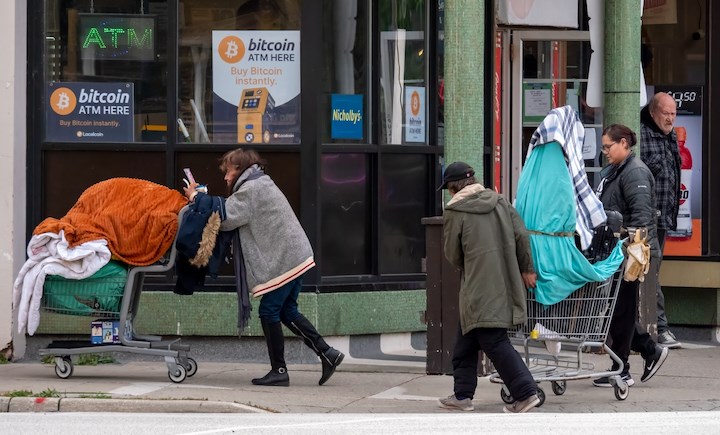
Affordable or rent-geared-to-income housing is clearly difficult to access, but it’s much, much harder for Sarnia-Lambton’s vulnerable population to find supportive housing.
Supportive affordable housing is for “high acuity” individuals with addictions, mental health challenges or brain injuries, Johnson explained. It’s regarded by many housing experts as mandatory to get people off the streets long term. With nurses, addiction services and other amenities onsite, supportive housing projects in other Ontario cities are proving to be the answer for the difficult-to-house.
In 2022, Lambton County searched for community partners to build supportive housing. There was no response. The money is still there, said Johnson. “We are still talking to groups that may be interested.”
A supportive housing project needs land as well as backing from various parties, not just the county.
“It’s not simple but the pieces are starting to align,” said Johnson. “We’re not entirely there but momentum is building to get all the partners at the table.”
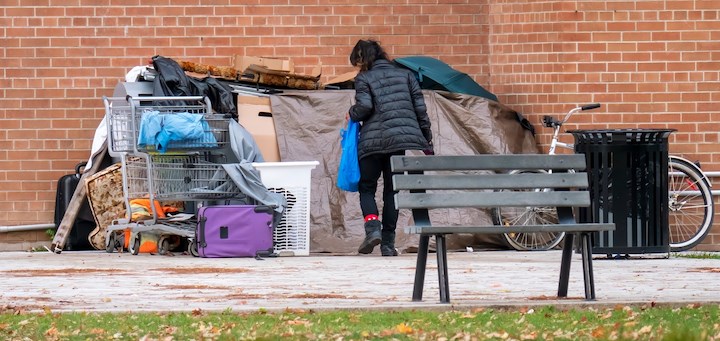
In the last year, the city has offered to donate a portion of a downtown parking lot to the county for affordable housing. Preliminary discussions started with a group of local Rotarians committed to the cause, as well as with a Christian charity called Indwell, which is creating affordable, supportive housing in other southwestern Ontario cities.
Meanwhile, the community is waiting for the completion of 24 “deeply affordable” apartments at Maxwell Park Place on London Road in Sarnia.
When the $7-million Maxwell Park Place opens – likely in 2024 –it will be in addition to the 57 units built on the same property in 2012.
“Maxwell Park Place will definitely have a positive impact on 24 individuals,” Johnson said. “But, unfortunately, it’s not going to solve our housing crisis.”
The line-ups for a hot meal at the Inn of the Good Shepherd are as long as they’ve ever been.
Not everyone there is homeless. Others are precariously housed in unsuitable living conditions or apartments that eat up most of their income.
Le Faive estimates about 30% are living rough. She knows they’ve come for the only hot meal most of them get in a day.
“There’s no judgement here,” she says. “I know you can’t fix everyone but I’ve been here long enough to have a rapport with the regulars.
“I’ll give them a hug and tell them I love them. After all, we’re all human.”
STORIES FROM THE STREET: Profile #1 – Monique and Chris
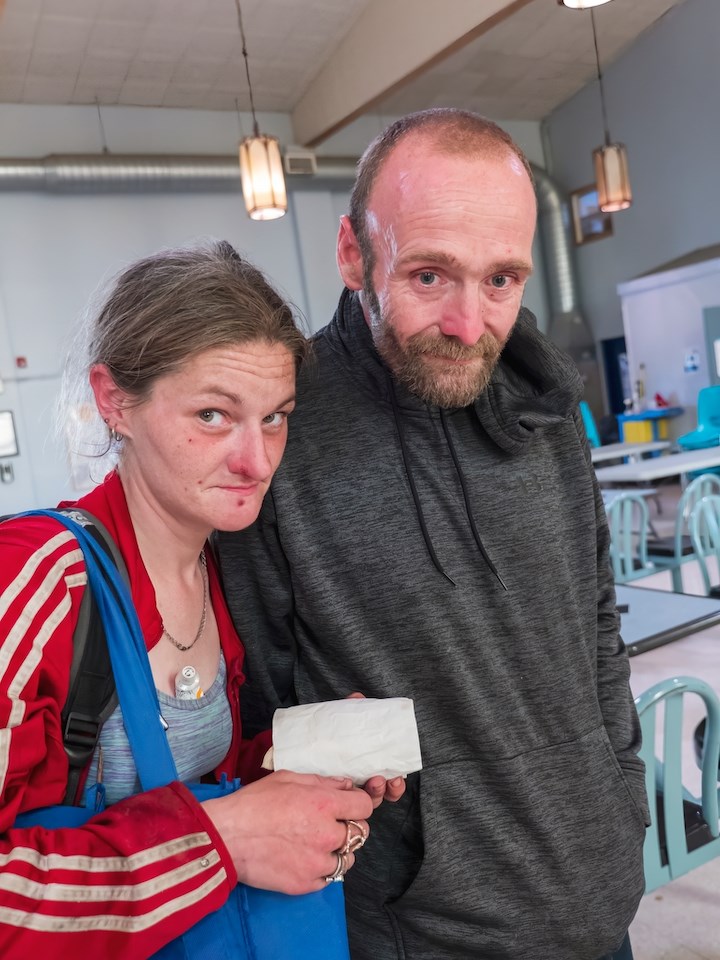
The tent that Monique Major and Chris Walters sleep in behind an abandoned house is the sixth one they’ve had in six months.
“People steal from us all the time,” says Chris. “We leave our stuff for 20 minutes and it’s gone. Even if you hide it, they find it.”
“I don’t know what to do anymore. I’m tired,” Monique says, laying her head down on a table in the dining room at the Inn of the Good Shepherd.
The couple are there nearly every day for a hot midday meal with about 100 others experiencing homelessness.
Sometimes Chris, 45, and Monique, 38, use the $300 they each get monthly from Ontario Works to get a motel room or to pay a friend to let them crash for a few weeks. Mostly they sleep rough.
“It’s hard for a friend to take two people,” explains Monique. And the shelters in Sarnia are not set up to keep couples together. There’s very few shelter beds for women. Even when Chris finds room for himself at a shelter, he refuses it because he won’t sleep without Monique. She has health problems and sometimes stops breathing at night.
“She needs me there to wake her up,” he says.
They have been a couple for 10 years and have two children together, a boy and a girl. When they met, Monique says she had an apartment. Chris says he was working and was a pipefitter for 16 years.
Lousy luck. Poor decisions. Bad breaks. Impairment. All contributed. When their children were 2.5 years and six months old, they were taken away. Chris lost his job and they lost their apartment.
Monique is a small woman with a quiet voice that’s almost inaudible at times. But there’s something about her that warns you she can be tough as nails.
When she talks about her children, tears come.
But when she talks about Chris losing his job, she is angry.
“You can’t show me one union member at one union hall that doesn’t do drugs or drink,” she says.
That feistiness gets her into trouble, Monique admits.
She is regularly banned or suspended from the city’s shelters.
“They don’t like me. They like him but they don’t like me,” she says.
So the street is often their only choice.
Last winter, when Monique was discharged from Bluewater Health after months there with a heart problem, they found a spot at the Vidal Street underpass where they set up a tent and tried to sleep sheltered from the brisk wind.
“It’s a good spot,” says Chris. “We can stay dry there when it’s cold. It’s really important to stay dry.”
But they say the authorities found them and ticketed them for trespassing. Each was fined $615. “I said we are homeless. How are we going to pay this? But they didn’t care,” says Chris.
Undeterred, they tried again to sleep in the same place. This time they say their tent was confiscated.
“It was a good tent too,” says Monique. “The best one we’ve ever had.”
SEE PART TWO OF STORIES FROM THE STREET IN TUESDAY’S JOURNAL
